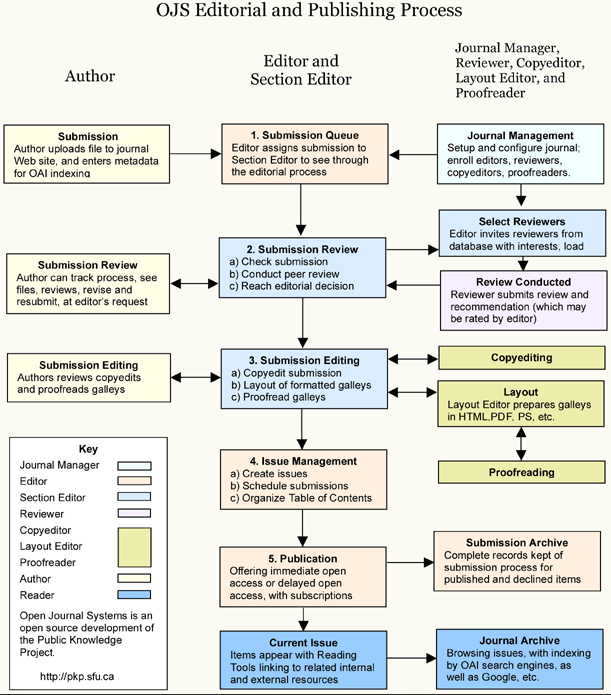Journal Manager
The journal manager is responsible for setting up the journal website, configuring system options, and managing user accounts. It does not involve advanced technical skills but requires filling out web-based forms and uploading files. Journal Manager also registers editors, section editors, copyeditors, layout editors, proofreaders, authors, and reviewers. Journal managers also have access to other journal management features and can create new sections for journals, set review forms, edit default emails, manage tools read, view statistics and reports, and more. Many journal managers also register as editors, enabling them to easily manage both journal settings and submissions in the editorial workflow.
Note
Although journal managers are a specialized journal role, journal managers should generally be considered trusted users of the entire system, because they have the ability to assume the identities of other users who may be listed in other journals.
Author
Authors can submit manuscripts to journals directly through the journal website. Authors are required to upload submission files and provide metadata or index information (metadata increases search capacity for online research and journals). Authors can upload multiple files, in the form of data sets, research instruments, or source text that will enrich the item, as well as contribute to a more open and robust form of research and scholarship. Authors can track submissions through review and editorial processes - as well as participate in copyediting and proofreading of submissions received for publication — by logging on to the journal website.
Editor
The editor oversees the entire review, editing and publishing process. Editors, working with the Journal Manager, typically establish policies and procedures for journals. In the editorial process, editors assign submissions to section editors for viewing through a review of submissions and post-editing. Editors monitor the progress of submissions and assist with difficulties. After the review is complete, editors usually see submissions through the editing process (including copyediting, production, and proofreading) although in some journals this remains the responsibility of the department editor in charge of submitting the review process. The editor also creates journal issues, schedule submissions for publications, organize a table of contents, and publish issues as part of the publishing process. Editors can restore Archived posts to active in review or in an edit list. Many Editors also register as journal managers, which allows them to easily manage editorial workflows and journal settings.
Section Editor
The section editor manages the review and editing of predefined posts. In some cases, the section editor tasked with viewing submissions through the review process will also be responsible for viewing submissions that are received through the editing process (i.e., through copyediting, production, and proofreading). However, most of the time, the section editor only works with the review process. , and the editor, acting in the section editor role, sees submissions through the editing process. The journal will have a policy on how assignments are divided.
Reviewer
Reviewers are selected by the editor or section editor to review submissions. Reviewers are required to submit reviews to the journal website and can upload attachments for the use of editors and authors. Reviewers can be rated by the editorial department, again depending on the policies of this journal.
Copyeditor
The copyeditor edits submissions to improve grammar and clarity, works with authors to make sure everything is in place, ensures strict adherence to bibliographic and textual journal styles, and produces clean, editable copies for editor layouts or production assistants to turn into ships that will in published journal format. Some journals have an editor or a section editor who plays this role.
Layout editor
The layout editor converts copyedited versions of submissions into vessels in HTML, PDF, XML, etc. — files that the journal has selected to use for online publication.

